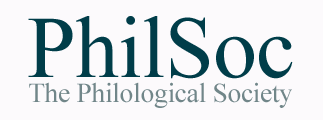Remote meeting 4.00 pm GMT
PhilSoc ECR Round Table 2021-22
Corpus approaches to phonetic~phonological variability and stability.
Friday 26th November 4pm-6.30pm *note new start time*
The event will take place online via Zoom.
Speakers
Dr Eleanor Chodroff, University of York
Dr Justin Lo, University College London/University of York
Dr Benjamin Molineaux, University of Edinburgh
Organiser
Dr Sam Hellmuth, University of York
Programme
4.00-4.05 Welcome (Sam Hellmuth)
4.05-4.45 Ben Molineaux: “How to [PLACE] fricatives in the Corpus of Historical Mapudungun”
4.45-5.25 Justin Lo: “Comparing /s/ with /s/: Cross-linguistic acoustic (in)stability among English–French bilinguals”
5.25-5.30
5.30-6.10 Eleanor Chodroff: “Structure in phonetic realization across talkers and languages”
6.10-6.25 15 minutes round table Q&A with all panellists
6.25-6.30 Closing words (Sam Hellmuth)
Each talk will be approx. 35 mins, with a short time available for questions immediately afterwards.
Abstracts
How to [PLACE] fricatives in the Corpus of Historical Mapudungun
Ben Molineaux (University of Edinburgh)
Minority, non-European languages — such as indigenous American ones — are critically underrepresented in the literature on historical phonology and sound change. Even where they are available, historical sources for such languages tend to be under-explored and a true philological tradition is lacking. In this talk, I will suggest that corpus methods emerge as ideal means for systematically compiling and exploring the available phonological data for such minority languages, focusing in particular on the missionary materials available in the Americas.
Using the newly-developed Corpus of Historical Mapudungun (CHM), I will explore the available evidence for the historical roots of this language's remarkable range of fricative place articulations, including labio-dental [f], interdental [θ], alveolar [s], alveolo-palatal [∫], retroflex [?] and velar [?]. An analysis of spellings and grammarian's comments over the past 400 years will be called upon to establish the contrastive status of the different segments. Particular focus is given to the nativisation of Spanish and Quechua loans which led to the borrowing of /s/, and to the various processes of `affective' alternation between [θ], [s], [∫] and [?] and their phonemic status throughout the historical record for Mapudungun.
Comparing /s/ with /s/: Cross-linguistic acoustic (in)stability among English–French bilinguals
Justin Lo (University College London/University of York)
This talk focuses on the production of the sibilant fricative /s/ among bilingual speakers. Cross-linguistically, the acoustic quality of /s/ is highly similar, yet second language (L2) learners may be attuned to fine-grained phonetic differences and accordingly shift their realisation across languages (Boyd 2018; Kitikanan et al. 2015; Quené et al. 2017). At the same time, speakers in other bilingual communities produce generally similar /s/ in each language (Johnson et al. 2019; Schertz et al. 2019). In the case of English and French, coronal consonants are often described to be articulated with different places of articulation and tongue-tip gestures, although the articulatory evidence for the fricatives /s z/ remains mixed (Dart 1991, 1998; Toda 2009). Using data drawn from the Voice ID Database (Royal Canadian Mounted Police, 2010–2016), the acoustic-phonetic study presented here investigates the extent to which bilingual speakers of English and French adopt distinct realisations of /s/ in the two languages.
The results reveal a cross-linguistically stable acoustic target of /s/ for English–French bilinguals, as they do not distinguish /s/ in each language by midpoint spectral moments. Language background does modulate the production of /s/, with L1 French speakers producing lower skewness and kurtosis than L1 English speakers. Language specificity of /s/, however, is found in the shape of the trajectories of its spectral moments and in the degree of within-speaker variability. These findings raise the possibility that there may be subtle differences in the place of articulation and tongue-tip gesture acquired by speakers of different L1s, but such subphonemic distinction is not acquired in the L2. I will further discuss the theoretical and practical implications of these findings for cross-language speaker comparisons in the area of forensic speech science.
Structure in phonetic realization across talkers and languages
Eleanor Chodroff (University of York)
A primary goal of linguistic study is to understand the range and limits of crosslinguistic variation. The study of phonetic variation is no exception to this pursuit, but access to suitable multilingual speech corpora has only recently become available. In this talk, I consider how we can make use of large-scale speech corpora to better understand the process of phonetic realization: that is, the projection of phonological segments into phonetic space. Through a series of case studies, I examine cross-talker and crosslinguistic variation and structure in phonetic realization.

